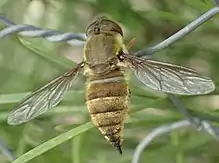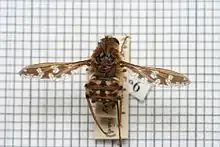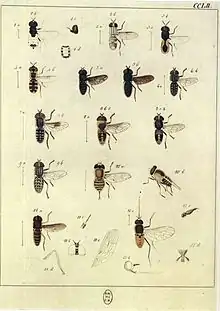Nemestrinidae
Nemestrinidae, or tangle-veined flies is a family of flies in the superfamily Nemestrinoidea, closely related to Acroceridae. The family is small but distributed worldwide, with about 300 species in 34 genera. Larvae are endoparasitoids of either grasshoppers (Trichopsideinae) or scarab beetles (Hirmoneurinae). Some are considered important in the control of grasshopper populations. Adults are often observed on flowers.
| Nemestrinidae | |
|---|---|
 | |
| Hirmoneura obscura | |
| Scientific classification | |
| Kingdom: | Animalia |
| Phylum: | Arthropoda |
| Class: | Insecta |
| (unranked): | Endopterygota |
| Superorder: | Panorpida |
| (unranked): | Antliophora |
| Order: | Diptera |
| Suborder: | Brachycera |
| Family: | Nemestrinidae Griffith & Pidgeon, 1832 |
| Subfamilies | |
| |


Genera
These 28 genera belong to the family Nemestrinidae:
- Aenigmestrinus Mostovskii, 1998 g
- Archinemestrius Rohdendorf, 1968 g
- Atriadops c g
- Ceyloniola c g
- Cyclopsidea c g
- Eohirmoneura Rohdendorf, 1968 g
- Fallenia c g
- Florinemestrius Ren, 1998 g
- Hirmoneura i c g
- Hirmoneurinae i g
- Hyrmophlaeba Rondani, 1864 g b
- Moegistorhynchus c g
- Nemestrinus c g
- Neohirmoneura b
- Neorhynchocephalus Lichtwardt, 1909 i c g b
- Nycterimorpha c g
- Nycterimyia c g
- Palembolus Scudder, 1878 g
- Prohirmoneura Handlirsch, 1906 g
- Prosoeca c g
- Protonemestrius c g
- Rhagionemestrius Usachev, 1968 g
- Sinonemestrius c g
- Stenobasipteron c g
- Stenopteromyia c g
- Trichopdidea i
- Trichophthalma c g
- Trichopsidea Westwood, 1839 c g b
Data sources: i = ITIS,[1] c = Catalogue of Life,[2] g = GBIF,[3] b = Bugguide.net[4]
Fossil history
Fossils of Nemestrinidae are known from several localities of various ages in Russia, Kazakhstan, Mongolia, Western Europe and North America, with the oldest described fossils being in the Middle-Upper Jurassic Karabastau Formation of Kazakhstan and Daohugou Bed of China.[5][6][7] Undescribed remains are known from the Upper Liassic of Germany.
- †subfamily Archinemestriinae Rohdendorf 1968
- †Aenigmestrinus Mostovski 1998 Karabastau Formation, Kazakhstan, Callovian/Oxfordian
- †Archinemestrius Rohdendorf 1968 Karabastau Formation, Kazakhstan, Callovian/Oxfordian
- †Mesonemestrius Zhang et al. 2017 Burmese amber, Myanmar, Cenomanian
- †Protonemestrius Rohdendorf 1968 Karabastau Formation, Kazakhstan, Callovian/Oxfordian Yixian Formation, China, Aptian
- †Ahirmoneura Zhang et al. 2008 Daohugou, China, Callovian
References
- "Nemestrinidae Report". Integrated Taxonomic Information System. Retrieved 2018-04-12.
- "Browse Nemestrinidae". Catalogue of Life. Retrieved 2018-04-12.
- "Nemestrinidae". GBIF. Retrieved 2018-04-12.
- "Nemestrinidae Family Information". BugGuide.net. Retrieved 2018-04-12.
- Mostovski, M.B. 1998. Revision of the tangle-vein flies (Diptera, Nemestrinidae) described by B.B. Rohdendorf, and new taxa of nemestrinids from the Upper Jurassic of Kazakhstan. Paleontological Journal, 4: 47-53.
- Ansorge, J., Mostovski, M.B. 2000. Redescription of Prohirmoneura jurassica Handlirsch 1906 (Diptera: Nemestrinidae) from the Lower Tithonian lithographic limestone of Eichstaett. N. Jb. Geol. Palaeont. Mh. 4: 235-243.
- Wedmann, S. 2007. A nemestrinid fly (Insecta: Diptera: Nemestrinidae: cf. Hirmoneura) from the Eocene Messel pit (Germany). Journal of Paleontology 81 (5): 1114-1117.
External links
- The genera of the family Nemestrinidae (Diptera: Brachycera) Nelson Bernardi in Arquivos de Zoologia versão ISSN 0066-7870 Arq. Zool. vol.24 no.4 São Paulo dez. 1973
- Images at Diptera info
- Images at BugGuide
- Bishop Museum
- U.S.D.A. Biological Control of Grasshoppers
- Discover Life